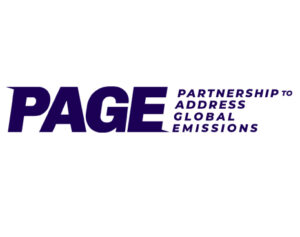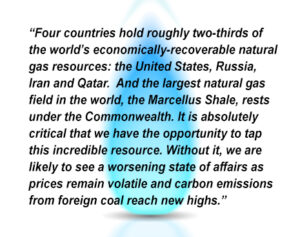By Toby Rice
 Over the past 15 years, the U.S. has led the world in reducing greenhouse gas emissions – thanks in large part to our replacing coal with natural gas. From 2005 to 2019, the reductions from this fuel switching roughly equaled the total emissions reductions of the U.K. Germany, Italy and Japan — combined. And those were the countries with the best track records for lowering emissions.
Over the past 15 years, the U.S. has led the world in reducing greenhouse gas emissions – thanks in large part to our replacing coal with natural gas. From 2005 to 2019, the reductions from this fuel switching roughly equaled the total emissions reductions of the U.K. Germany, Italy and Japan — combined. And those were the countries with the best track records for lowering emissions.
Unfortunately, foreign coal usage exploded in 2021, and in just one year, the increase in emissions surpassed all the emissions reductions made by U.S. solar and wind energy since 2007. In 2022, the situation has been exacerbated by skyrocketing energy prices and Russia’s war against Ukraine.
A solution exists. It exists in Pennsylvania, and it is natural gas.
Four countries hold roughly two-thirds of the world’s economically-recoverable natural gas resources: the United States, Russia, Iran and Qatar. And the largest natural gas field in the world, the Marcellus Shale, rests under the Commonwealth. It is absolutely critical that we have the opportunity to tap this incredible resource. Without it, we are likely to see a worsening state of affairs as prices remain volatile and carbon emissions from foreign coal reach new highs.
By rapidly increasing liquefied natural gas exports, the U.S. can address three pressing global needs: reducing emissions, lowering prices and strengthening energy independence. Unfortunately, we lack the critical infrastructure today to allow us to respond, and new projects are regularly halted by lawsuits and a failed approval process.
we lack the critical infrastructure today to allow us to respond, and new projects are regularly halted by lawsuits and a failed approval process.
My company, EQT, teamed with TC Energy and Williams to form the Partnership to Address Global Emissions (PAGE), a nonpartisan coalition dedicated to promoting U.S. policies that help protect the climate through the increased production of U.S. natural gas. I am grateful to have both the Pennsylvania Chamber of Business and Industry and the Manufacturers and Business Association join the Pennsylvania Advisory Counsel.
Going forward, we are also committed to expanding the reach and breadth of our coalition. Joining with us in this endeavor are leading climate advocates and labor groups, which include Paul Bledsoe of the Progressive Policy Institute; Naomi Boness, from the Stanford Natural Gas Initiative and Stanford Hydrogen Initiative; James T. Callahan, general president of International Union of Operating Engineers; Sasha Mackler with the Bipartisan Policy Center; Mark McManus, General President of United Association of Journeymen and Apprentices of the Plumbing and Pipe Fitting Industry; and Richard Morningstar with the Atlantic Council’s Global Energy Center.
Natural gas development has strong bipartisan support. For example, a recent survey indicates that over 70 percent of Pennsylvania voters, including strong majorities of both Democrats and Republicans, support increasing production. It’s also an important election issue. The same survey showed that by a 34-point margin, Pennsylvania voters say they would be more likely to vote for political candidates who support increasing natural gas.
We have seen similar numbers across the United States, and we think there is a growing consensus about what needs to be done. Domestically, unleashing U.S. natural gas will help address inflation and create jobs in Pennsylvania. Simultaneously, an abundance of U.S. natural gas will allow us to provide our European allies with a reliable, affordable supply of energy while reducing carbon emissions. It’s not only an incredible opportunity, it is an incredible duty.
To learn more about PAGE, visit Partnership to Address Global Emissions.